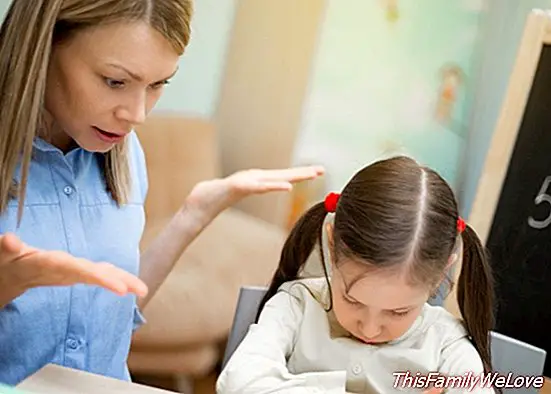My teacher has mania: who is right?

When Maria has entered the house, it has not been necessary to ask her what mood she came from: "Mama, Dona Carmen has a mania for me, she has punished me unceasingly unfairly, she has spoken to me in Lourdes class and the" senor "has punished me"Similar scenes to this one are normal at home." Maria, at nine years old, has a lively genius and a huge sense of what is just and unjust, or, at least, what she thinks it is.
That Maria says that is easy to understand. It would not be so if I had instead of six, eighteen; neither would it be that his mother seemed true. The boys and girls of Maria's age are in the sensitive period in which the sense of justice emerges with enormous force. Later it will be extended to the judgment of society. In these early years he focuses much more on school and family.
Sympathies and antipathies between teachers and students
It is true that sometimes teachers let us carry with sympathies and antipathies. Less than it seems, but it happens; and it is usually a symptom of those who start in the profession or those who have not reached professional maturity. In a class with twenty-five or thirty students there is a wide variety of situations and there are usually three or four unruly students, good or bad students, who are often corrected. Now it is fashionable among pedagogues to talk about hyperkinetic students, that is what has always been called movidos.
The students who at the beginning of the Primary wanted their teacher enormously, when they reach fourth or fifth they start to distance themselves, the judgment about their professors begins to be critical and they do not seem necessarily well to everything they do or say . It is a logical reaction, typical of psychological evolution, and announces what will be accentuated with adolescence.
Reactions of the family: the overprotection of the parents
The most notable differences occur as a result of the parents' reaction. Currently, the social environment is more demanding and critical with teachers than a few years ago. Before, the decisions of the educational team were supported by almost all the families of a school. At present, there is a great disparity from one family to another. When a son or daughter in a critical psychological phase is joined by overprotective parents, we have the right breeding ground for family-school tension to occur.
A few years ago, a frequent mistake was not listening to the son or daughter, and without mediating conversation, supporting the teacher's performance. It was not unusual to get another slap if he came home complaining that he had been hit. This has changed but, in any case, in some cases it is as if things have turned upside down: now the child is always right and the teacher has to prove otherwise.
Listen and analyze those involved
In my opinion, the son or daughter should always be listened to, even knowing that out of passion or lack of perspective he will often be wrong. The good sense of the parents will lead them to the fact that if the matter is serious or repetitive, they go to the school to talk with the tutor or the Head of Studies. Sometimes it will not be opportune for the son to know this visit; in others, there is no problem in commenting, as long as the visit is not considered as a grievance, neither for the child nor for the teacher. The educational result of the clashes is usually null or counterproductive.
Most of the times it is not necessary to give more importance to what are the small natural frictions of coexistence. Children must get used to knowing that their teachers are people of flesh and blood, that there are some more friendly than others, that one is very demanding and another less. In short, life is varied and the sooner you get used to that diversity, the sooner you will adapt to the world.
Ordinarily the answer to this childish excuse of the teacher's supposed mania, should be to help the child to recognize his personal responsibility and to assume the consequences of that bad performance, low academic performance ... Only in those cases that with sufficient foundation we perceive that the boy or girl is right, proceed to act differently.
In many occasions the tutor has enough data about teacher and student to give us a correct advice. If the affected person is the tutor himself, it is advisable to go to someone in the management team.
In the teacher - student conflict, who is right?
For a teacher it should not be an affront to ask for forgiveness from a student for a bad performance. That is not to lose authority except for those who, out of pride, are not willing to rectify. For the same reason, students must be taught to ask for forgiveness, in public or in private. Passion and blindness are much more frequent among students than among teachers and a confrontation between teacher and student is not usually a good method.
In principle, and until proven otherwise, equity should be assumed in the teacher and therefore does not act by sympathy or antipathy.When this is not the case, the immediate superior must correct the teacher with all the necessary clarity but always saving the moral authority that the teacher needs to have in front of the students.
José Manuel Mañu Training Director of the Gaztelueta School




